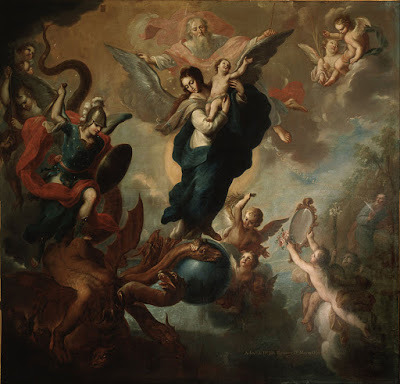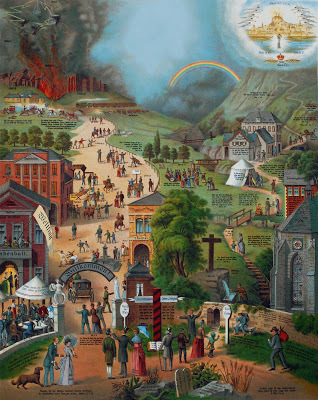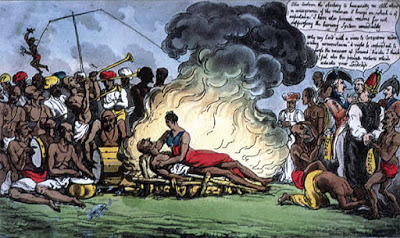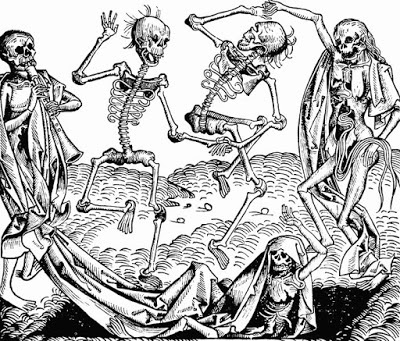Stephen Roney's Blog, page 254
February 28, 2020
Tracing the Hand of God in Current Events?
 The Virgin of the Apocalypse
The Virgin of the ApocalypseStories of the rapid spread of COVID-19, the coronavirus, have been sounding apocalyptic. Stories of people collapsing in the street. Cruise ships wandering the seas, refused all harbour. Especially combined with the plague of locusts sweeping through Africa and Asia at the same time. And, oh yes, the prior and ongoing disease infecting the Asian pork supply.
None of this really has the potential to be literally apocalyptic—the end of the world. Nevertheless, could we be seeing the wrath of God? Does God have it in for East Asia?
Most readers, no doubt, who are not Evangelical Christians, will scoff. We are beyond such superstitious notions, surely.
Nevertheless, the Evangelicals have a point. In the Old Testament it is plain that God sends plagues to express displeasure. Read the Book of Exodus.
Moreover, it simply stands to reason. Given that God exists and gives a damn what happens to man, why wouldn’t he? Of course he would.
God exists; we know that from cold logic. So it is not such a silly notion after all.
Ha, the worshippers of the great god Science will respond, we have had many such plagues throughout history. Where’s the evidence that they ever did any social good, rather than being random disasters?
Good of you to ask. Consider the Black Death. I have seen the argument that it led to the end of serfdom and the rise of democracy. Aside from discrediting existing regimes, it forced up the price of labour, obliging the ruling class to treat the common laboring people better.
Or the Lisbon earthquake of 1755. The argument is common that it shook the facile confidence in the status quo that characterized the early Enlightenment, and prompted the Romantic rebellion. Which led, soon enough, to the American and the French Revolutions, and liberal democracy as we know it.
Those two are off the top of my head. I suspect examples could be multiplied, if anyone dared attempt such an interpretation of history.
An important qualification must be made here. It is equally clear that God does not send plagues or other natural disasters to punish sin. That is too facile. Jesus refers us to the tower of Siloam:
At that very time there were some present who told him about the Galileans whose blood Pilate had mingled with their sacrifices. He asked them, “Do you think that because these Galileans suffered in this way they were worse sinners than all other Galileans? No, I tell you; but unless you repent, you will all perish as they did. Or those eighteen who were killed when the tower of Siloam fell on them—do you think that they were worse offenders than all the others living in Jerusalem? No, I tell you; but unless you repent, you will all perish just as they did.”
We all die anyway. God does not need to send a disaster for this purpose, and there would be no point in doing so. He kills us one by one. Nor does physical death amount to a punishment, for a good man.
Rather, a plague or disaster can eliminate a sinful culture or regime, one that is promoting sin.
This was the case for the Egyptian plagues. It was not that the Egyptians who suffered from the plagues were sinful. The intent was to change the policies of the Egyptian government, which was enslaving and committing genocide.
This was presumably the case for Sodom and Gomorrah. According to the Bible, there was not one inhabitant who was not guilty, but apart from this, clearly, these were cultures that socially endorsed homosexual gang rape.
And the Canaanites, according to the Bible, practiced ritual child sacrifice. While not a natural disaster, this led Yahweh to command the Hebrews to wipe them out. The sin was not individual; it was embedded in the culture.
Now, uncannily enough, the progress of the coronavirus up to this point actually looks as though it fits this premise.
If you were God, which world government or culture would you most want to turn from their present course, or perhaps overthrow?
Surely the government of China would be at the top of that list. They are officially atheist, and warring against religion. While not the world’s worst government in this regard—that would be North Korea—China also holds the largest proportion of the human population under its control, and has the greatest ability to project its power and influence elsewhere.
High time, if you were God, to take them down.
Significantly, the Chinese people think the same way: they are primed to understand any natural disaster as the fault of the government. It is an indication of Heaven’s anger. So apart from the fact that the government of China might be blameworthy for being the apparent source of the virus—if it escaped from a government lab—and for trying to suppress reporting of it early on, sending the virus to China may be an efficient means for God to express his will and get results.
Now what about North Korea? Also atheist, also aggressively anti-religious. We do not know what is happening in North Korea—the government controls all information flow. But rumours are that the disease is already rampant there.
And Koreans share the Chinese idea about the “mandate of heaven.”
But why then is it also hitting South Korea?
Not, to begin with, in order to overthrow the government. Since South Korea now has a functioning democracy, a plague seems unnecessary and overkill. Unless it is aimed in this case at something in the popular culture.
Korea is an incubator for a lot of strange religious sects. Koreans are deeply religious, in a sense, but often in a frivolous way. The virus raging there was spread primarily by and through one of them, Shincheonji. Whatever else the virus may end up doing there, it seems well targeted to discredit that sect, the leader of which proclaims himself the Second Coming of Christ. This makes him, in Christian terms, the Antichrist.
Suppose the virus is soon checked in South Korea; then this will be the main effect it has had: to discredit Shincheonji, and perhaps other such unorthodox millennial sects.
After North Korea, the government I’d most like to see fall is Iran. Aside from being oppressive towards its own people, Iran has been exporting trouble across the region if not the world. And working on nuclear capability. While nominally religious, it is not religiously orthodox. In the context of Shia Islam, as I understand it, a theocratic government is, in the absence of the Imam, a blasphemy. Mixing politics and religion can and usually does result in a takeover of religion for political purposes, rather than vice versa. God is entirely liable to want to snuff that out.
And the virus seems to be on track to spread more thoroughly through Iran than perhaps even China.
Although Qom seems to be the centre of the Iranian outbreak, pilgrimages to Qom have not been suspended, and the holy sites remain open. The government’s reported reasoning is that the pilgrimage to Qom is healing, and therefore valuable in order to fight the illness.
Which may encourage those experiencing symptoms to do their best to get to Qom, and mix with the crowds.
This is putting the Lord your God to the test; this is necromancy.
It also reminds us that the legitimacy of the Iranian government relies heavily, like China’s, on the supposed mandate of heaven.
If the outbreak gets truly out of hand there, it is therefore a clear indication, even to the government itself, that God is against the government.
What about all the poor pilgrims who might die on the Qom pilgrimage? Doesn’t God care about them?
The logic of the tower of Siloam is familiar to Islam as well. If one dies on pilgrimage, by tradition, once goes straight to heaven.
The one other nation in which the virus seems currently out of control is Italy.
As with South Korea, Italy has a functioning democracy; so a plague is not useful in order to change a government.
But as with South Korea, Italy is the international headquarters of another religious group: the Vatican.
Not that Catholicism is a millennial cult; but any good Catholic will say that there is a problem at the Vatican. A year ago, a lot of Catholics were calling on Pope Francis to resign, because of his evident implication in the McCarrick scandal in the US. Before that, people were speaking of a corrupt “Lavender Mafia” dominating matters in Rome.
Unfortunately, in Catholic tradition, there is no way to remove a Pope if he will not resign. Meaning the only way may be for God to intervene. The pope and the men at the Vatican who are ultimately responsible for this rot in the church, if the accusations are true, are elderly. They are in the age cohort most likely to find the coronavirus to be fatal.
Sending the virus to Italy might be, in part, for this purpose. After all, the Vatican is, like Qom, a pilgrimage site, especially from other parts of Italy. This Pope likes to get close to the crowds and grasp hands.
Reportedly, the Pope himself has now fallen ill. There is no indication yet that it is the coronavirus.
Again, if so, this is not to be understood as punishment for sin. Yet if the present pope’s policies are seriously misguided, and spiritually harmful, God might well want to call him quickly upstairs, for the good of all his church.
Now; why an epicentre in Northern Italy, instead of Rome?
Because that is closer to the border.
The appearance of the virus in northern Italy seems also as if calculated to challenge the EU concept, which is first and foremost that of open borders. The easy spread of the virus across borders lacking any stops or customs checks amounts to a compelling argument to ratchet back on the “ever closer union” enterprise. Maybe there was a reason for those borders that we all overlooked.
One is reminded of Chesterton’s advice: never tear down a fence until you can say why it was there in the first place.
It is perhaps not self-evident that God should be opposed to the EU or globalization; or that he should prefer the nation-state. Unless you remember the story of the Tower of Babel. That is the Biblical account of the creation of nations—by God, precisely to prevent the enterprise of a world government. This was considered human presumption. There is only one rightful world king, and anyone else presuming to that office is the Antichrist.
Or unless you remember the Catholic doctrine of subsidiarity, declared by Pope Pius XI “a fundamental principle of social philosophy, fixed and unchangeable.” The moral principle is that decisions should always be made at as close to the individual level as possible. This is to respect the essential moral importance of free will. Free will is why we exist. This principle of subsidiarity the EU violates, in forever drawing more decisions to the distant centre.
And because the structure of the EU is not democratic, and beyond even national control, it cannot be turned or thwarted by lesser means. It might take a virus to make the point.
If so, part of the point must be made by having the virus now spread through the EU. Which seems to be happening.
If, as looks likely at the moment, the virus then spreads everywhere, the fact that it infected China, Iran, North Korea, Shincheonji, and the Vatican may be insignificant. And it will look far less like some divine judgement.
If, on the other hand, the virus is one way or another stopped soon in its tracks, this will strengthen my impression that it has been God’s weapon to root out specific sick governments and organizations.
There are early indications that the virus may have peaked in China; although we cannot trust the government figures. It seems to have been contained in Singapore and in Vietnam. There are also claims here and there of some effective inoculation or treatment coming soon.
It is striking to me, in the meanwhile, that the virus does not seem to have spread in the Philippines. This seems a little uncanny, because Filipinos are working abroad everywhere, more than any other nationality, and always coming and going. There are especially a lot of Filipinos in Hong Kong, South Korea, Taiwan, and Japan, regularly flying back and forth. People are accustomed to flying to Manila from Hong Kong just for the weekend.
The islands even recorded three early cases; all Chinese. One died, the first death from the virus outside China. The other two have now recovered. Yet no spread, so far as we know. Moreover, Filipinos live packed closely together, ideal for virus spread.
How to account for the difference, while the disease has jumped containment during the same period in Japan, South Korea, and Iran?
Perhaps because in the Philippines it would not serve to upset a disordered culture or regime.
Say what you want about the current Duterte administration; say what you will about Philippines government corruption. The Philippines is nevertheless a functioning democracy; such extreme measures as a plague are not required to change things. And the Philippine culture itself is genuinely religious. Were the government system or the culture to collapse, it is unlikely it would be replaced by anything better.
And so this looks like preliminary evidence that the virus is selective and divinely directed.
Events may prove me wrong. We shall see.
'Od's Blog: Catholic and Clear Grit comments on the passing parade.
Published on February 28, 2020 13:22
February 27, 2020
Buy "Playing the Indian Card" at a Big Discount!

Truth fans! Playing the Indian Card, the book that gives you the true history of Canada's indigenous relations, is on sale at half price at Smashwords.
That's only $2.50 for a whole lot of great reading.
Act fast--the sale price is good only for March 1-7th.
Quick--click here!
Happy reading!
'Od's Blog: Catholic and Clear Grit comments on the passing parade.
Published on February 27, 2020 09:54
February 26, 2020
Jesus Was Not a Nice Man
 The Broad and the Narrow Way
The Broad and the Narrow WayI realize grimly that a large segment of mankind has, in practice, no morality. Their sole idea is that one is supposed to try to get along with whomever one is currently dealing with.
This is the concept of “being nice.” It is so common as a mock morality in my experience that I think it is the position of the great majority: the prime directive is to be “nice,” and not upset anyone. Anyone who has principles is not nice, and is liable to be condemned for it.
As Jesus warns in the Beatitudes: blessed are those who are persecuted for righteousness’s sake.
This is especially a Canadian fault; Kathy Shaidle wrote a book called The Tyranny of Nice.
It is also surely the bones beneath the corpse of “cultural relativism.” The essential idea of is that the only possible morality is to go along with what those around you are doing.
This explains how abortion has become the norm. Some women adamantly want an abortion; so the “nice” thing is to let them have it. Unborn children are not visible or audible; so there is no need to get along with them. It is not nice to bring them up.
The same inert moral mass could explain the Holocaust. The Jews were rounded up and sent away to camps. It no longer matters to get along with them. It no longer matters if they are executed.
This produces a delicate balance. Social harmony will always be preserved by the easiest path. If anyone is noisily demanding, they may be shunned or imprisoned. But if there are too many of them, and dealing with them becomes too common, the easiest option becomes to give them whatever they demand.
Whether their demands are reasonable or unreasonable does not enter into this equation. An oppressed group might use this to their advantage; so might a privileged group wishing to preserve or expand their privilege.
But it is far less likely to work for an oppressed group. They are more likely to be shunned or imprisoned before they reach such a critical mass that they need to be accommodated.
There is no principle to this “niceness,” and great evil is produced by it.
There is nothing moral about trying to get along with whomever you are speaking to. It is pure cynical self-interest.
I believe that Jesus was speaking of this “niceness” mock morality when he warned about the broad path to destruction:
"Enter in by the narrow gate; for wide is the gate and broad is the way that leads to destruction, and many are those who enter in by it. How narrow is the gate, and restricted is the way that leads to life! Few are those who find it.”
It is not necessary to infer that the majority of people follow this path, although that seems to be the case. It is the path itself that is majoritarian, “the broad path”—the path of always just going along and getting along with those nearby.
'Od's Blog: Catholic and Clear Grit comments on the passing parade.
Published on February 26, 2020 08:14
The CPR on CPR
Discussing the rail stoppages with my brother, retired engineer for CPR, I suddenly realized how symbolic it all is. It must have been in the back of the minds of the protestors too.
The problem that brought us here is that the politicians and the commentariat, the clerisy, have been aggressively promoting the idea for decades of multiculturalism and, more recently, “intersectionality.” Meaning, in a word, tribalism. Our primary level of commitment, we have been told, must be to our special interest group. Not only are we to ignore the national good: the nation is our enemy. Our fellow Canadians are the enemy.
Our own prime minister has proudly announced that “Canada has no mainstream.”
Canada’s original mainstream, at Confederation, was, in fact, the railroads. And so blocking them is the ultimate symbolism. This is what we have been told we are supposed to do; and this is what some people are doing. They are acting the doctrine out, and to the point of violence.
Let’s hope it leads to a turning point in our thinking, rather than the disintegration of our country.
'Od's Blog: Catholic and Clear Grit comments on the passing parade.
Published on February 26, 2020 07:24
February 25, 2020
Things Fall Apart
There seems a general sense that Canada is falling apart. Rail lines and other facilities are being blocked by protesters. Alberta is talking separation.
We are dissolving into tribes and special interest groups. Nobody is thinking of the national interest or the good of all.
But this is the inevitable consequence of multiculturalism and intersectionality. Canadian politicians and Canadian governments have been aggressively promoting tribalism for decades. The prime minister himself has declared that there was no Canadian mainstream.
Where else was this going to lead?
We are now on the verge of violence.
'Od's Blog: Catholic and Clear Grit comments on the passing parade.
Published on February 25, 2020 07:49
The Growing Socialist Threat of Sanders

It is funny to watch a lot of commentators suddenly panicking at the prospect of Bernie Sanders as the Democratic nominee, including especially many on the left.
After all, he came reasonably close to becoming the nominee in 2016; he was the logical frontrunner for 2020 as soon as Clinton lost that time. How can they have only realized now that he is a “socialist”? How can it only be important now?
And not only is he suddenly discovered to be a socialist. It now turns out that he is, like Trump, another Russian plant. And he’s too old, and he’s hiding how bad his health is.
To some extent, every clearly established frontrunner draws fire. We just went through the taking down of Bloomberg by the other candidates. But Sanders, by comparison, is being taken down by the commentators and the backrooms. And Sanders ought to be already thoroughly vetted, since this is not his first run, and he has been the frontrunner before. It seems hysterical.
The fact that he is a socialist should not sound alarm bells for any Canadian or European. We have avowedly socialist candidates in contention all the time. The US system has checks and balances, as well, preventing any sudden political lurches. Sanders would have to get his initiatives passed by two houses of congress, then vetted by the Supreme Court as constitutional.
As for Russia backing him, it is hard to understand why it is news that Russia tries to influence American elections. After all, America tries to influence elections elsewhere all the time. Former president Obama openly endorsed Justin Trudeau during Canada’s recent federal election. It is hard to believe that only Russia interferes in the US. If the various foreign diplomatic corps and intelligence agencies are not always trying to influence elections anywhere for what they perceive as their interests, they’re not doing their job.
As to Sanders being too old, that concern is only significant if the alternative is Pete Buttigieg. Biden, Warren, Bloomberg, or Trump are almost the same age.
An underlying and more reasonable concern might be that Sanders cannot win in the general election--because he is too far out of step with the average voter. That may be so; but by the same token, I thought Reagan was too far right to be elected. I thought the same of Stephen Harper. For the most part, people do not vote on ideology or even issues, but on their perception of the character of the candidate.
I suspect the real problem is not that Sanders is a socialist, or a Russian plant, or anything else, but the shock among the commentariat at realizing they are no longer in control even of the left. They had decided that Sanders would not be the nominee, had already taken ruthless measures to make this so, and neither the voters nor the dice have fallen in their favour.
Now Sanders is going to win the nomination at least. He will take over the party, if not the White House, and he will have reason to bear grudges and to clean house.
'Od's Blog: Catholic and Clear Grit comments on the passing parade.
Published on February 25, 2020 06:46
February 24, 2020
Come Gather Round Me, Carmelites
 St. John of the Cross
St. John of the CrossCome gather round me, Carmelites,
And praise our chosen man;
Stand upright on your legs awhile
Stand upright while you can.
For soon we go where he has gone,
His bones are underground;
Come sling those holy rosaries
And let the chant resound.
And here’s a cogent reason,
And I have many more
He shunned all use of footwear
Preferring to be poor
Whatever light a dark night’s got
He brought it all to be
And here’s the happy reason:
That St. John saw no “me.”
Spanish Johnnie was a poet;
And one of such a kind
Each Spanish man that sings a song
Keeps St. John in his mind.
Yet Johnnie was a humble man,
Who fought the devil down,
And a humble man's a mighty man,
So pass the wine cup round.
The Prior and his party-- Stephen K. Roney (after W.B. Yeats).
A tragic story made,
This martyr throw in prison
And twice-fortnightly flayed;
But poems that live longest
Are written in distress,
And St. John wrote his Canticle
And St. John passed his test.
'Od's Blog: Catholic and Clear Grit comments on the passing parade.
Published on February 24, 2020 06:45
When Kiples Cease Their Kipling
 Rudyard Kipling
Rudyard KiplingThere used to be a movement in Canadian poetry called “people’s poetry.” Perhaps it still exists; I can find no trace online.
The idea was to bring poetry back to the common people.
But the group was resolutely left wing. As all official Canadian poetry has become.
This is a fatal problem, because the common people are not left wing.
In fact, the most popular poem among the UK general public is Rudyard Kipling’s “If.” Calling for personal responsibility in the manner of Jordan Peterson. But Kipling was a fellow who wrote poetry from the working class perspective; sometimes in cockney dialect.
In Canada, the only poetry readings that draw crowds are for “cowboy poetry.” Expressing a world view akin to that of country music, in the manner of Robert W. Service—the bestselling poet of all time, not just in Canada, but it the world.
And ignored or rejected by the poetry establishment, including the “people’s poetry” people. Again, the thing about Service is that he wrote from the working class perspective.
It seems that “their people,” as Hamilton is supposed to have said of Jefferson, “is a great beast.” It is an academic construct, quite unlike any people you might meet in the subway or on the 401.
Robert W. Service is perhaps rejected only for speaking for the lower class and being unforgivably accessible to people without an English degree. Despite the fact that he is, in technical terms, an exceptionally good poet. As is Kipling.
Kipling is rejected for his full-bore advocacy of empire. You could hardly be less politically correct than that today. Worst of the lot, no doubt, is “The White Man’s Burden.”
Let’s have a look:
Take up the White Man's burden—That sounds pretty offensive. Non-Europeans “half devil and half child”? “Fluttered and wild”; “caught”? These are terms to describe animals.
Send forth the best ye breed—
Go bind your sons to exile
To serve your captives' need;
To wait in heavy harness
On fluttered folk and wild—
Your new-caught, sullen peoples,
Half devil and half child.
Yet the criticism seems to be that these non-Europeans do not raise their children properly—“breeding” is mentioned. They are wild in that sense, still children in that sense; they lack morality.
This might be true or false, but it is not racist. The Victorians believed they had reached a pinnacle of morality. This conviction was shaken then by the experience of the world wars, but there was and remains evidence behind it.
Take up the White Man's burden—The conventional idea today is Marxist—that the point of Empire was to exploit the foreign people for profit. Kipling sees empire as, instead, a sacrifice in financial terms, for the benefit of the colonized.
In patience to abide,
To evil the threat of terror
And check the show of pride;
By open speech and simple,
An hundred times made plain.
To seek another's profit,
And work another's gain.
It turns out that Kipling is right. The Empire was a financial burden on Britain, and the same was true of the other European empires, with perhaps the sole exception of Leopold’s Congo, which Conrad so richly condemns in Heart of Darkness. After the Second World War, Britain could no longer afford their empire. If it were actually making money, this would not have happened. Empire is expensive; more recently, we saw the Soviet Union and Warsaw Pact collapse for financial reasons.
The European empires were indeed entered into, as Kipling says, as a civilizing mission. They might have been misguided, but they were well-intentioned. They were acts of charity and of civic responsibility.
Take up the White Man's burden—
The savage wars of peace—
Fill full the mouth of Famine
And bid the sickness cease;
And when your goal is nearest
The end for others sought,
Watch Sloth and heathen Folly
Bring all your hopes to nought.
“Heathen” here might make one suppose Kipling was speaking of the spread of Christianity. He cannot have been; the immediate occasion for the poem was the American acquisition of the Philippines. The Philippines had been Christian for centuries—for longer than the USA.
He seems instead to be speaking of what might loosely be called “Enlightenment ideals.” Empire brought peace, ending the endless local wars; it brought greater prosperity, it brought medical advances.
Take up the White Man's burden—
No tawdry rule of kings,
But toil of serf and sweeper—
The tale of common things.
The ports ye shall not enter,
The roads ye shall not tread,
Go make them with your living,
And mark them with your dead!
Again the idea is of service: of building ports and roads for others to use.
And in this, surely, Kipling is right. The British built the rail system, the ports, of India, and then left them for the Indians. They dug the Suez Canal, and then left it to the Egyptians. The Americans built the Panama Canal, and then left. They built Aramco and the Saudi oil industry, and then left. Others generally reaped the benefits.
 Railway bridge, British India, 1900.
Railway bridge, British India, 1900.Notably, the UK pulled out of the Persian Gulf, Iraq, and Saudi Arabia right when the oil industry was making the area profitable. That makes no sense if the prime motive of empire was profit. It makes more sense if the prime motive was service; at this point, the area could look after itself.
Take up the White Man's burden—
And reap his old reward:
The blame of those ye better,
The hate of those ye guard—
The cry of hosts ye humour
(Ah, slowly!) toward the light:—
"Why brought ye us from bondage,
Our loved Egyptian night?"
The stanza seems to disprove the charge of racism, since it describes the colonized as equivalent to the Hebrews, God’s chosen people. And it implies that these “subject races” are as capable of development. The problem, then, is not genetics—race—but the bondage of cultural backwardness.

Take up the White Man's burden—
Ye dare not stoop to less—
Nor call too loud on Freedom
To cloak your weariness;
By all ye cry or whisper,
By all ye leave or do,
The silent, sullen peoples
Shall weigh your Gods and you.
The use of the plural, “Gods,” here, seems to preclude a Christian interpretation. If he were speaking as a Christian, he would be speaking heresy. The Gods would presumably be the values cherished by Victorian English culture: equality, democracy, discipline, duty, honesty, justice, good manners, and sound accounting principles.
Take up the White Man's burden—
Have done with childish days—
The lightly profferred laurel,
The easy, ungrudged praise.
Comes now, to search your manhood
Through all the thankless years,
Cold-edged with dear-bought wisdom,
The judgment of your peers!
It seems to me that Kipling escapes the charge of racism. He is being read uncharitably here because the modern left hates him for something else: for being an unbending moralist. This, of course, is the reason why they are opposed to the suggestion that any culture might be superior to another—because it implies that any moral stance might be superior to any other. Morality is an unpleasant suggestion to the immoral.
 Indian custom of suttee--widow burning.
Indian custom of suttee--widow burning.I have no problem with Kipling’s moralism. On the other hand, I find him unpalatable because he consistently bases it on the trivial: on “the judgement of your peers,” or being “grown-up,” or “manly.” These are worldly baubles.
One ought to behave morally out of a commitment to morality, to the good, and out of love for God and one’s fellow man; not out of pride, which is to say, so that others will think well of you. Prestige. Kipling’s ethics are pre-Christian pagan ethics.
I suspect that this failure of transcendence was, in the end, what caused Europe to lose its appetite for empire. Eventually, once you eventually thought it through, it all seemed so pointless.
'Od's Blog: Catholic and Clear Grit comments on the passing parade.
Published on February 24, 2020 06:31
February 22, 2020
Welcome to the Plague Years
 The Dance of Death: souvenir of the Black Plague.
The Dance of Death: souvenir of the Black Plague.Things are getting worse regarding the coronavirus. In fact, I think “assume the worst” might have been the right advice all along.
Here is what I think we know:
1. The virus escaped from a Chinese lab. This, which originally was scorned as a conspiracy theory, is pretty clearly true. This might explain why it has such sinister characteristics. It seems possible it was being worked on as a bio weapon.
This would explain the draconian measures undertaken by the Chinese authorities. They knew more or less what they were dealing with, and knew it was alarming.
2. It is extremely contagious. Perhaps it was designed to be extremely contagious. A recent report has one Korean carrier infecting over 40 people.
It can spread through the air; it can remain live on surfaces for an unknown time. The Chinese have been spraying everything in view with bleach.
3. It can spread before the victim shows symptoms. This makes it virtually impossible to stop by quarantine. You don’t know who to quarantine.
4. It has an incubation period of perhaps 24 days, during which the victim may show no symptoms, but be contagious.
This is unfortunate, because, until now, the Chinese and other governments have been quarantining people for 14 days before declaring them virus-free.
5. Some reports suggest that a victim can remain contagious even for an undetermined time after recovery.
6. It produces a death rate on first infection 20 times greater than the flu; about at the level of the notorious Spanish flu a century ago. And that is assuming the health care system is not overwhelmed. Wherever the virus takes hold, we can expect the health care system become overwhelmed.
7. Surviving the virus does not create immunity. It is apparently possible to become reinfected. The second infection is worse than the first. It looks as though it can cause sudden death. There are videos of people in Wuhan collapsing in the street.
Leaving open a further question. If you survive the second infection, could there be a third infection, and so forth? This seems probable.
8. Nobody has immunity, because the virus is so new. If the virus spreads, sooner or later, everyone gets it.
9. It has escaped containment in China. It is now loose in South Korea, Japan, and Iran. Italy also looks worrisome.
The Iranian medical system and government structure is probably incapable of an effectively quarantine, because of its relative underdevelopment. It is likely to spread from there.
Add this up, and we might have a doomsday weapon.
All is not lost; the virus might spontaneously mutate, and someone might at any moment come up with a more effective treatment.
'Od's Blog: Catholic and Clear Grit comments on the passing parade.
Published on February 22, 2020 13:33
February 21, 2020
Life in the Bubble

The current housing market defies logic.
As I see it, the baby boomers should have been retiring for the past ten years, and downsizing. The generations that follow them are smaller. So the demand for housing should be easing.
The need to live in large cities, where the housing shortage is extreme, should also have been declining, with the increasing feasibility of telecommuting. And the attractions of convenience that might attract people to the cities have also been declining: with the Internet, you can get all the entertainment you want anywhere; with Amazon, you can purchase anything you want, and have it delivered anywhere. The cities should be emptying out.
The cost of housing is also rising much faster than incomes. This should be pushing people out of the market, at least for larger homes.
Given all these considerations, housing costs should be declining. Instead, they are skyrocketing.
It seems to me it has to mean we are in a speculative bubble. And it is, sooner or later, going to pop, with devastating results.
We even already saw it happen, in 2008.
People are buying property on speculation. When housing prices dip, as they will, a lot of folks are going to stop paying their mortgages, and a lot of money is going to disappear.
The current COVID-19 crisis has almost shut down China’s economy. It may get worse. That is sure to have consequences for the world economy. This might be the shock that starts the run on housing.
'Od's Blog: Catholic and Clear Grit comments on the passing parade.
Published on February 21, 2020 05:58



